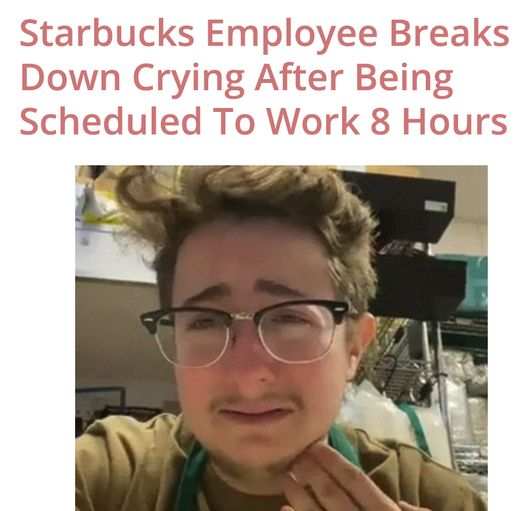On October 17, 2024, a Starbucks barista’s emotional reaction to their work schedule set off a wide-ranging discussion about employee rights and management practices in the service industry. In a video that quickly went viral on social media, the barista breaks down in tears while describing the difficulties they face working at the popular coffee chain.

The video reveals the barista’s frustrations with the demands of the job. While they cite poor management and rude customers as major stressors, it was the requirement to work an eight-hour shift that seemed to push them over the edge. The barista expressed deep frustration, feeling they had no control over their schedule and were struggling to manage such a long workday.
A Wave of Sympathy and Criticism Online
The response to the video was both swift and intense. Many viewers empathized with the barista’s plight, sharing their own experiences with long shifts, difficult customers, and feeling overwhelmed in the service industry. The video has not only sparked conversation but also raised important questions about the treatment of workers in fast-paced environments like Starbucks.
One user, @coffeequeen, resonated with the barista’s experience, commenting, “As someone who has worked in the service industry for years, I understand the frustration of long shifts and demanding customers. Employers need to do more to support their staff and foster a positive work environment.”
However, not all responses were sympathetic. Another commenter, @customerfirst, took a different stance: “I understand that customer service can be tough, but the barista should be grateful to have a job. Many people would love to have that opportunity.”
These mixed reactions underscore the broader debate about working conditions in the service industry, especially regarding expectations of long shifts and dealing with challenging customers. While it’s true that working extended hours is common in this field, the emotional toll it takes on employees can’t be ignored. Burnout and stress are major issues, and the incident has put a spotlight on how employers should be addressing employee well-being.
The Role of Employers in Supporting Workers
The video has raised critical questions about the responsibilities of employers in creating a positive work environment. While long hours and unpredictable schedules are often part of the service industry, it’s essential to consider how these conditions affect employees’ mental and physical health. Employers have a duty to ensure that staff members feel respected, supported, and heard.
In response to the viral video, the Starbucks location’s manager issued a public statement apologizing for the barista’s experience. The statement acknowledged the need for better communication and more support within the workplace. It read, in part, “We take our responsibilities as employers seriously and are committed to fostering a supportive work environment for all employees.”
This proactive approach is encouraging, demonstrating that the manager is aware of the issues and is willing to make changes to improve working conditions. Acknowledging and addressing employee concerns is a vital step toward creating a healthier work culture, where staff members feel valued and understood.
Why Listening to Employees Matters
The emotional breakdown of the Starbucks barista in the video is more than just a reaction to an eight-hour shift—it’s a sign of deeper issues in the workplace. Employees need to feel that their concerns are taken seriously and that their well-being matters. By actively listening to staff members and working collaboratively to address challenges, employers can build stronger relationships and a more positive workplace.
This incident serves as a reminder that when employees speak out, it’s often because they are struggling and need support. In this case, the barista’s tears were a clear indicator of the stress they were experiencing. Employers who take the time to understand these challenges and offer solutions can create a more sustainable work environment.
A Call for Continued Dialogue and Change
The overwhelming response to the Starbucks barista’s video highlights a broader need for ongoing discussion and action regarding employee rights in the service industry. This conversation isn’t just about one barista—it’s about how companies can better support their staff, minimize burnout, and create more positive work environments.
The incident at Starbucks has opened up important discussions about work-life balance, management practices, and the importance of treating employees with respect. As more people share their stories and concerns, it becomes clear that there’s a need for real change within the service sector. By prioritizing employee well-being, both employers and workers can collaborate to create a healthier, more equitable, and more productive workplace for everyone.





